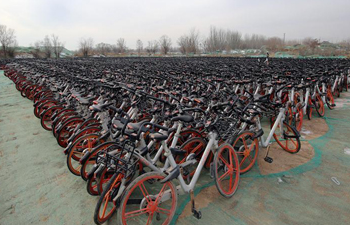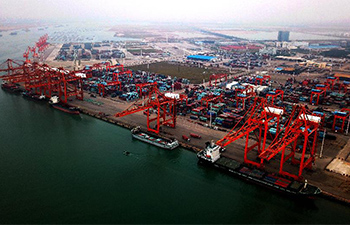THE HAGUE, Jan. 18 (Xinhua) -- With Berlin and Paris stepping up efforts to drive forward pro-federal European Union (EU) reforms following a preliminary coalition deal in Germany between Chancellor Angela Merkel and the Social Democrats (SPD), the Netherlands, which prefers a more liberal and less federal EU, faces serious challenges to secure an influential position in the post-Brexit 27-member bloc.
"With Germany moving closer to the visions of French President Emmanuel Macron, concern is growing about the position the Netherlands will obtain in the new balance of powers to be developed in the EU after Brexit," said Adriaan Schout, coordinator of European Union (EU) affairs at Clingendael, the Hague-based institute for international relations.
Schout spoke of the Netherlands' "disappointment" in Germany aligning with Macron, given also SPD leader Martin Schultz's recent statement, in which the former president of the European parliament pledged "an ever closer Europe," suggesting that "those who do not agree can leave the EU." Schultz has also called for a United States of Europe by 2025.
The coalition of Merkel's conservatives (CDU/CSU) and the SPD devoted three pages of the 28-page blueprint agreed last Friday on Europe and suggested that "the renewal of the EU will only succeed if Germany and France work towards it with all their strength." Merkel and Macron have pledged to submit a common proposal on eurozone reforms by March, while European leaders are expected to take decisions at the European Council summit in June.
The document emphasizes that "Europe has to take its fate into its own hands more than before" and it states that the next German government will continue to expand investment initiatives like the European Fund for Strategic Investments (EFSI). It also states that the country is in favor of turning the European Stability Mechanism (ESM), which provides emergency financial help to stricken eurozone economies, into a full European Monetary Fund (EMF).
Moreover, the document explicitly says that the new government would be ready to pay higher contributions into the EU budget than before, and promises to support "funds for economic convergence and social convergence and support of structural reforms that can be a starting point for future investment budget for the eurozone."
The Netherlands views these proposals with caution, including Macron's position to set a joint budget, a joint eurozone parliament and a finance minister for the eurozone.
Dutch Prime Minister Mark Rutte has adopted a hard line against the deepening of the eurozone, explained Schout.
In recent months Rutte has repeatedly stated that there is no need to change the architecture of the euro. At the last meeting with his colleagues in the European Council in December, Rutte voiced his concerns over Macron's proposals on the reform of the Economic and Monetary Union (EMU). Instead, he favors a higher level of convergence among the European countries, achieved through reforms.
Commenting on the position of turning the ESM into an EMF run by the European Commission, the EU's executive, Rutte said: "That is different from the current fund, which is governed intergovernmentally. The Netherlands prefers that it stays that way."
The Netherlands also disagrees with an increase of contributions to the EU budget, pledged last week by EU Budget Commissioner Gunther Oettinger. The German commissioner suggested that Brexit will leave a shortfall of 12 to 15 billion euros (14.7 to 18.4 billion U.S. dollars) per year in the budget.
In an interview earlier this week on Dutch TV, the country's finance minister Wopke Hoekstra said EU members like Ireland, Denmark, Spain and the Netherlands, which are already experiencing the damage of Brexit, should not be expected to also pay the bill.
The Dutch question the effectiveness of the EFSI and view it with caution, noted Schout, referring to the so-called Juncker Plan, a 315-billion-euro investment vehicle for the EU, which is due to increase up to 500 billion euros after 2020.
To balance the Franco-German alignment in determining Europe's future direction, the Netherlands is seeking to form alliances among Nordic, Baltic and central European countries to promote a more liberal and less federal EU, now that the United Kingdom (UK) is in the process of leaving the EU.
The Dutch prime minister has met in recent months with his counterparts from Ireland, Denmark, and from the Visegrad Four -- Poland, Hungary, Slovakia and the Czech Republic. He also met with newly-elected Austrian Chancellor Sebastian Kurz in Vienna on New Year's Day.
"The meeting in Vienna was part of a series of contacts that the Dutch prime minister is making with leaders of mainly 'smaller' European countries in order to create alliances capable of weakening the Berlin-Paris axis," Schout suggested.
"The Netherlands seeks to set up a group of states, a bloc strong enough to force Berlin to listen to the Netherlands as a representative of smaller states on European issues, and in particular the debates on the deepening of the eurozone," the expert on Europe said. "With the UK gone, a powerful player is missing to keep the Franco-German axis in check."
At the same time, Schout acknowledged that it would be more difficult for the Netherlands to put forward the Dutch position and would likely involve making compromises.
Nicolas Veron, senior fellow and cofounder of the Brussels-based Bruegel institute, suggested "it is too early to have firm views" on the issue of the deepening of the eurozone following the commitments made by Germany on the Grand Coalition's blueprint "given the possibility that the coalition platform gets rejected by the SPD and/or modified."
SPD delegates will vote on whether to move talks to the next stage at a party conference on Jan. 21. (1 euro = 1.22 U.S. dollars)

















